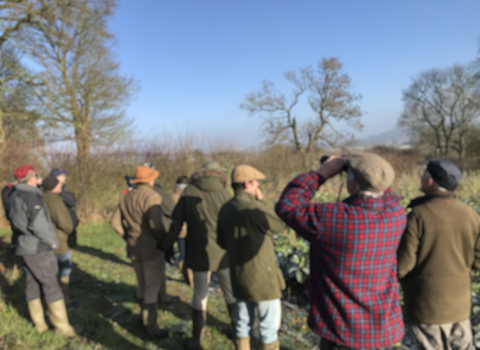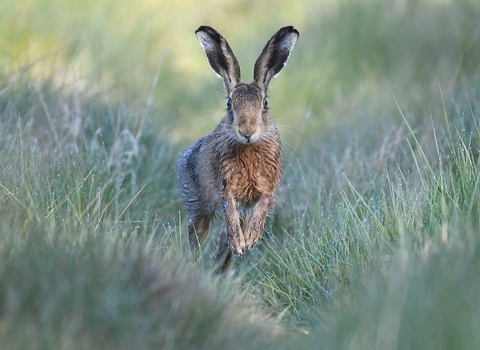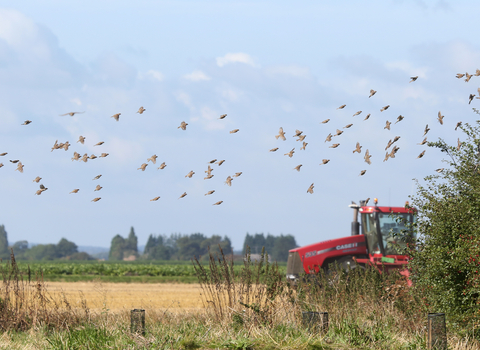Agricultural land covers 70% of Warwickshire and if we are to realise our vision of landscape recovery, we must work collaboratively with farmers to support nature and wildlife
A thriving natural environment is fundamental to the security of the economy and wellbeing of society, but it is under strain: pollinators and natural habitats are in decline; carbon is escaping from our exhausted soils and rather than holding water, our soils are washing into our rivers and flowing out to sea. Farming policy and payments are changing now that the UK has left the EU. We must use this moment to fix the problems we have created. We should invest in the restoration of our land and wildlife so that it can continue to provide us with all the things we need: sustainable and nutritious food, wildlife habitats, flood and drought management, clean water and air, carbon storage and places for us to enjoy.
The Wildlife Trusts have worked together to produce ‘What next for farming?’, a vision for the future of agricultural policy in England. This vision outlines how a new agricultural policy could be directly linked to the benefits which farming provides to wider society beyond food production. As custodians of the countryside we believe that with the right support, farmers and land managers can provide a wide variety of benefits for all of us.
A healthy, wildlife-rich environment gives us:
Clean air and water
Nutritious food and drink
A vibrant economy
Places to walk, play and exercise
Resilience to flooding and drought
Reduced impacts of climate change
What we’re doing
Here in Warwickshire we have been working with farmers for decades, supporting them to manage their land with nature in mind and create more sustainable approach to agriculture. Our Tame Valley Wetlands and Dunsmore Living Landscape schemes have been supporting land managers to restore hedgerows, plant trees, create wetlands and re-naturalise rivers across the county.
Warwickshire Farming Networks
We have also helped to set up three sustainable farming groups that cover the whole of Warwickshire, Coventry and Solihull. The groups help farmers come together to share best practice on incorporating wildlife management and sustainable farming techniques into their farms. The Arden Farm Wildlife Network was the first of these groups to be established. Now with over 50 members, it has delivered a huge range of events and additional projects including facilitating free trees for farmers to plant on their land, free barn owl boxes and monitoring, the tree sparrow village project and the Meadows projects which is now in its third year.
Another way in which we work with farmers is through our partnership with Severn Trent. This project helps provide advice to farmers who manage land in certain parts of our area. The land in this area collects rainwater, which is then gathered and processed for drinking water. Any pollution in these areas needs to be removed before it’s safe to drink, so our partnership helps to reduce the pollution going into rivers and streams from across the landscape.
Our new farm advice service provides more in-depth on farm advice on habitat management and restoration, regenerative farming techniques and helps farmers with applications for agri-environmental schemes and other funding.
These projects help wildlife to live beyond the borders of our nature reserves, contributing to more, bigger, better, joined up Nature Recovery Networks and playing a key role in our 30by30 ambitions.
Information for Landowners
Farmers are increasingly being pressed to not only provide healthy food at low prices but to also take care the best care of the environment and help boost biodiversity on their land. This can be especially difficult if you don’t know how care for habitats on your land in the most nature friendly way. It is a tough job to do, and we at Warwickshire Wildlife Trust are here to help. We have created some short informative sections for you to consider when planning your farm management including some common farm habitats and considerations for managing them and some information on nature-friendly farming practices that could help you to decrease reliance on artificial inputs and farm with nature in mind.
Below are some links to useful websites that support nature friendly farming:
- https://www.nffn.org.uk/ The nature friendly farming network champion healthy food production alongside nature and have produced several reports that demonstrate the viability and value of nature friendly farming: https://www.nffn.org.uk/wp-content/uploads/2020/10/20012-NFFN-Report-Nature-means-business-DIGITAL-1.pdf (Nature means business report)
- https://www.agricology.co.uk/ Agricology collates information from different practices and organisations
- https://www.cfeonline.org.uk/ Championing the farmed environment
- https://farmwildlife.info/
- https://ahdb.org.uk/knowledge-library
- https://leaf.eco/
If you’re considering wildlife and the environment in your farm management we’d love to hear about it. Please get in touch via the form above.



